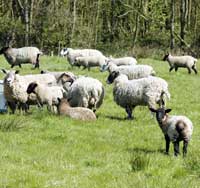Answer to costly sheep worm infection closer

Scientists are one step closer to combating a stomach worm infection in sheep that costs UK farmers £80 million a year.
Researchers at the University of Edinburgh and the Moredun Research Institute have discovered a molecule that may help the worm beat the sheep’s natural defences.
The disease – called parasitic gastroenteritis (PGE) – is caused by a worm that makes its home in the stomach of sheep. The hope is that the discovery of the new molecule – called Tci-MIF-1 – will help design new vaccines and drug treatments.
PGE causes energy to be diverted away from a sheep’s vital processes, such as meat, milk and wool production to repair its damaged gut and boost its immune response. It can cause weight loss and dehydration and is sometimes fatal.
The discovery of this molecule is an exciting step forward in our understanding of the way worms affect mammalian immune systems, says Jacqui Matthews, lead researcher at the University of Edinburgh’s Centre for Infectious Diseases.
“As our knowledge expands, we come closer to finding new ways to control the disease they cause.”
